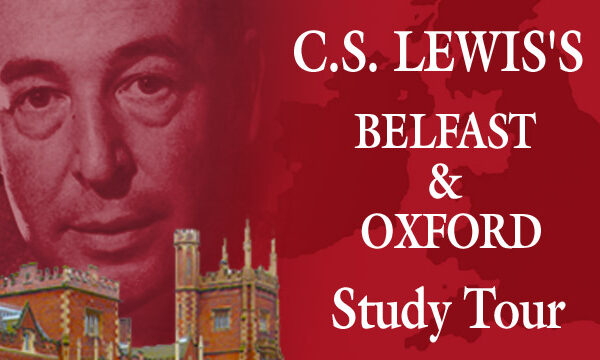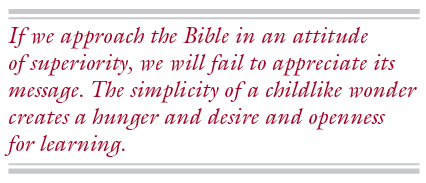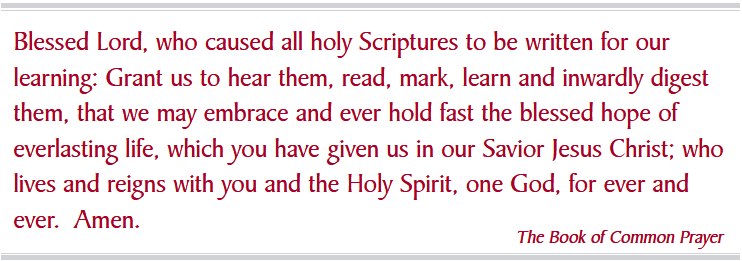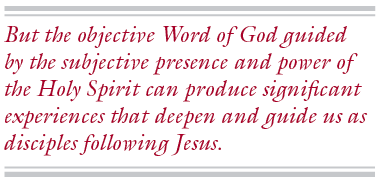Back to series



George Whitefield's Guidance for Searching the Scriptures
Click here to open a Print - Friendly PDF
| Jesus reveals the critical link between knowing Scripture and discipleship when he asserts, “If you continue in my word, you are truly my disciples” (John 8:31).1 It is impossible for anyone to be a faithful follower of Jesus Christ without an awareness of and commitment to regular engagement with the Bible. Although there are many contemporary resources and guides for studying the Bible, much wisdom can be gained from the writings of earlier Christians.
George Whitefield (1714–1770)2 is certainly representative of this. He along with John and Charles Wesley, John Newton, and others provided significant leadership for the eighteenth–century English revival. His persuasive sermons and eloquent language helped to pioneer open–air preaching. This became a necessity when many of his fellow Church of England clergymen prevented him from preaching in their pulpits due to his strong emphasis on the new birth and conversion in Christ. He normally preached a sermon a day and often up to three sermons on Sundays, regularly attracting crowds of five thousand to ten thousand listeners. He also made seven preaching trips to North America and exerted a strong influence on the colonial Great Awakening. Whitefield nourished and prepared his soul for this strenuous ministry through his avid reading of Puritan devotional classics and his daily meditation on Matthew Henry’s Commentary on the Bible.3 While many rich treasures in his sermons are still appropriate for today, one, preached on John 5:39—“The Duty of Searching the Scriptures”—is particularly germane.4 Whitefield recognized the absolute priority of grounding the Christian life on the inspired Word of God. His insights are still valuable today. The goal of this article is to examine Whitefield’s principles for searching the Scriptures so that we might recover them to guide our own study of and meditation on the Bible. For, in reality, the more inflamed our souls are by the Word of God, the more we will be able to continue in Christ’s word so that we might truly be his disciples.
Jesus responded by declaring, “You are wrong, because you know neither the scriptures nor the power of God” (Matt. 22:29). Whitefield quickly affirms this truth by announcing that throughout the history of the church errors “flowed from the same fountain, ignorance of the word of God” (379). However, we know more accurately from the reading of church history that some errors result from an intentional mishandling or abuse of Scripture. Even though Jesus was “the eternal God,” he too made Scripture his daily guide. Whitefield further asserts that Jesus depended upon the Holy Spirit to guide him in his use of Scripture. Throughout this sermon Whitefield emphasizes the importance of the Holy Spirit in reading and applying the Bible. Following this introduction Whitefield presents his two points. The first is that every person must search the Scriptures (379). This is not just the responsibility for pastors or teachers, but for all God’s people. All who seek to follow Jesus as his disciples must be active students who apply God’s Word to their lives. Whitefield discovered the importance of this personally while still a student at Oxford and a member of the Holy Club with the Wesleys. Their emphasis was on a persistent and daily reading that combined both an intellectual search for knowledge and spiritual application of experience. To accomplish this, their reading of Scripture included prayerful meditation on the text.5 This was a pattern that Whitefield practiced throughout his life. The majority of the sermon is in the second section, where Whitefield presents seven specific principles for searching the Scriptures.
First, he counsels us to always remember to emphasize the main theme of Scripture, which is Jesus Christ, the way of salvation. Jesus challenged his listeners to search the Scriptures. One reason was to help them discover that the Word, properly sought, always leads a person to Jesus Christ, the Living Word. Whitefield practices what we might call christological exegesis. That is, when reading the Old Testament, one observes how the prophecies, sacrifices, and other events prefigure and point to Jesus. What is nascent in the Old Testament is fulfilled in the New Testament. For any biblical passage, Whitefield’s goal is that we should always be alert to how the Bible helps us to grasp and better understand Jesus. Second, we need to approach the Bible with a “humble child–like disposition” (381). This principle of humility has been clearly championed throughout every age of the church. Amma Syncletica, one of the early desert mothers of the Christian East, vividly illustrates this in reference to the biblical example of Luke 18:9–14. She says, “Imitate the publican, and you will not be condemned with the Pharisee. Choose the meekness of Moses and you will find your heart which is a rock changed into a spring of water.”6 Humility creates a teachable spirit that is eager to search and willing to welcome new truths that the Holy Spirit presents to us. The humble person is not only receptive to the pleasant words of comfort, but is also willing to embrace the more difficult, but equally important, words of conviction or correction. If we approach the Bible in an attitude of superiority, we will fail to appreciate its message. The simplicity of a childlike wonder creates a hunger and desire and openness for learning. This reflects both Jesus’ teaching on the humility of a little child (Matt. 18:2–5) and the receptive nature of the good soil that welcomes the Word of God in the Parable of the Sower (Mark 4:20). Unfortunately children often lose this wonderful quality as they go to school and face the inimical challenges of competition and comparison with other students.
For developing imagination, our best teachers are children. Their eagerness to listen and learn is a critical quality as we approach the Word with a desire to grow as Jesus’ disciples. Further, the purpose of this sanctified imagination is to personalize our reading. The passages we read were intended not only for people in earlier generations; they were written to us today. Third, we must approach our reading of Scripture with sincerity. Whitefield declares the importance of motivation; unless we “desire to do the will of God” (382), our reading is likely to be skewed and of limited lasting value. Reading that is motivated merely to attack others or justify a specific position, without any desire to know God more personally by applying the passage to one’s own life, is unlikely to yield the proper fruit regardless of how intense a person reads. Philip Jacob Spener (1635–1705), a leader of early Lutheran pietism who also emphasized the importance of laypeople searching the Scriptures, similarly commends sincerity: “The mind of the person who wishes to read in a fruitful manner must stand in true repentance, have in particular a heartfelt desire to truly know the divine will, and out of such a desire direct its reading.”7 Fourth, Whitefield stresses that to read Scripture effectively one must “make an application of every thing you read to your own hearts” (382). He reminds us that everything recorded in the Bible “was written for our learning” (382). By its very nature Scripture is formative and transformative if we take the message seriously and apply it to our lives. At this point Whitefield notes the importance of experience. This was a characteristic of the early evangelicals, which they had inherited from the Puritans of the previous century. Then referred to as experimental divinity, heart religion, or experimental piety, today we would call it experiential learning. Regardless of the terminology, the point is that we are reading something not merely for information, but to be formed and transformed by it. In other words, we recognize the reality that Scripture is the living Word of God and will accomplish all that God intends for it (Isa. 55:11). Here Whitefield stresses the role of the Holy Spirit, who was foundational in a person’s experience of God. While not specifically referenced in this sermon, there is a clear allusion to John 16:13, that “when the Spirit of truth comes , he will guide you into all truth.” With the emphasis on experience, this application is specific, particular, and deeply personal. Fifth, and directly expanding upon his last principle, Whitefield urges us to “[l]labor to attain that Spirit by which they [i.e. the Scriptures] were written” (383). He illustrates this principle by reminding us that Nicodemus’ ignorance of Jesus (John 3:1–21) was due to his lack of awareness of the Holy Spirit. The role of the Spirit and Word has had a long association in the church, but this teaching was emphasized in the Protestant Reformation with John Calvin and then the Puritans. Whitefield was often accused of enthusiasm, which was not a healthy label in the eighteenth century. It was frequently associated with the more unbalanced extremes of ecstatic religious experience. In light of that criticism, he articulates the dynamic interaction between the Word and Spirit: Though it is the quintessence of Enthusiasm to pretend to be guided by the Spirit without the written Word, yet it is every Christian’s bounden duty to be guided by the Spirit in conjunction with the written Word of God. Watch, therefore, I pray you, O believers, the motions of God’s blessed Spirit in your souls, and always try the suggestions or impressions that you may at any time feel, by the unerring rule of God’s most Holy Word.8
The interaction of the Word and Spirit creates the possibility for healthy experiences of God. Our contemporary culture seems overly consumed by experience, with little sensitivity to an important factor: discerning an experience’s validity. But the objective Word of God guided by the subjective presence and power of the Holy Spirit can produce significant experiences that deepen and guide us as disciples following Jesus. Whitefield also recognizes that there are multiple levels of meaning in Scripture. This is again an ancient principle extending back to the Old Testament. Whitefield acknowledges there can be literal and spiritual meanings of a passage. The contemporary church, perhaps especially some evangelicals, is reticent to acknowledge this approach. Devout evangelical Christians of the eighteenth century would first read the Bible in a literal and historical sense. They typically followed this with a typological or spiritual reading, reflective of the christological emphasis previously mentioned. This spiritual reading of Scripture was still strongly present in the preaching and teaching of Charles Spurgeon in the nineteenth century. It is interesting to note the parallels between these early evangelicals and the growing popularity of the Theological Interpretation of Scripture among some evangelical theologians today.9 Whitefield was not naïve to the potential for misuse or possibility of overemphasizing spiritual reading; Scripture should always be used as a guide for accurate interpretation of reading and preaching the Bible. This fifth point and the previous section on application and experience are the two longest topics of this sermon. Significantly, the Holy Spirit occupies the primary role in both principles. Whitefield concludes this topic by arguing from common sense for cultivating a dynamic dependency upon the Spirit’s interaction with the Word: Sixth, pray and ask God to send the Spirit to guide your reading of Scripture. While this might sound similar to the fifth point, Whitefield here expands discussion of the role of the Holy Spirit. Jesus spoke to his disciples about this principle in the Upper Room: that the Spirit of truth (John 16:13) would guide them into all truth. Whitefield’s concern here is that we read the words of Scripture not only at a surface level, but more deeply that “they might be inwardly ingrafted into our hearts” (384). Prayer is an essential guiding resource in this regard. Whitefield encourages us to frequently intersperse our reading with short prayers to the Holy Spirit over every word of the text. Seventh, Whitefield concludes with the reminder that searching the Scriptures must be done continually. It is not an isolated practice that we do when we are in trouble but rather a habit that continually refreshes our lives. He suggests that the imagery of searching the Scripture parallels the intentionality and intensity of a person digging for a precious treasure. Once we discover something of value and truly grasp its worth, we will not treat it casually. What is more precious for Christians who seek to follow Jesus than saturating their hearts and minds in God’s revelation? Therefore Whitefield appropriately challenges us to read the Bible both “devoutly [and] daily” (384). The introductory words of this article, which note the necessity of continuing in Christ’s words, connect nicely with this final principle. Following Jesus as his disciple is a lifelong adventure. We never outgrow our need for searching the Scriptures or inviting the Word to dwell within us fully.
So Whitefield concludes his sermon by reminding his listeners not to grieve or quench the Holy Spirit by despising or ignoring Scripture. Rather, he asserts that “unless corrected by the Spirit and word of God, you shall not enter into his heavenly kingdom: for unless you delight in God here, how will you be made meet [i.e. fitting] to dwell with him hereafter” (385). It is important to realize that Whitefield is not offering us a specific method or technique of how to study the Bible. Rather, his focus is on the proper attitude and approach that we should have as we search the Scriptures. These principles are transferable whether we read the Bible using the inductive study method, the manuscript method, the practice of precept upon precept, or lectio divina. His basic concern is that we read the Bible in such a way that the liberating truth of Scripture can penetrate into our lives and address both our heads and hearts. Eugene Peterson communicates this same message with equal passion. His provocative work Eat This Book has the inviting subtitle, A Conversation in the Art of Spiritual Reading. Peterson’s central conviction is that Scripture must be read in a participatory manner. He maintains: “The word of God is a dialogical word, a word that invites participation. Prayer is our participation in the creation, salvation, and community that God reveals to us in Holy Scripture.”10 Earlier in the book he expands this theme in a way that Whitefield would strongly affirm. Peterson writes: Clearly Whitefield and Peterson share the same agenda in this regard. If we are serious about being Christ’s disciples, we must read the Bible in such a way that we are renewed and transformed by it. This comes by reading it as if we were engaging in conversation with the characters of the various stories under the guidance and power of the Holy Spirit. It is appropriate for George Whitefield to have the final word as he integrates these various strands: Significantly, Whitefield emphasizes the operation of the Holy Spirit to enlighten, quicken, and inflame one’s soul with the Word of God. The desired end is not only to read for information but to “inwardly digest,” a phrase Whitefield borrowed from The Book of Common Prayer that vividly depicts the formative nature of the Word of God. Whitefield’s practice echoes the admonition of Colossians 3:16, that the Word of God dwell within one’s heart, and it smartly summarizes Jesus’ call for all who would follow him to continue in his word, that we might truly be his disciples.
Notes
|
|

Tom Schwanda
Professor, Senior Fellow for Christian Spirituality, CSLITom Schwanda is associate professor of Christian Formation and Ministry emeritus at Wheaton College and adjunct associate professor of Christian Spirituality at Fuller Theological Seminary. Tom earned a Ph.D. from Durham University, a D.Min. from Fuller, and a M. Div. from New Brunswick Theological Seminary. He also studied at Gordon-Conwell Theological Seminary. He is the author of numerous articles and book chapters and three books, including The Emergence of Evangelical Spirituality: The Age of Edwards, Newton, and Whitefield and is currently preparing a book on George Whitefield, a biography that will highlight the importance of Puritans in his ministry.

 COPYRIGHT: This publication is published by C.S. Lewis Institute; 8001 Braddock Road, Suite 301; Springfield, VA 22151. Portions of the publication may be reproduced for noncommercial, local church or ministry use without prior permission. Electronic copies of the PDF files may be duplicated and transmitted via e-mail for personal and church use. Articles may not be modified without prior written permission of the Institute. For questions, contact the Institute: 703.914.5602 or email us.
COPYRIGHT: This publication is published by C.S. Lewis Institute; 8001 Braddock Road, Suite 301; Springfield, VA 22151. Portions of the publication may be reproduced for noncommercial, local church or ministry use without prior permission. Electronic copies of the PDF files may be duplicated and transmitted via e-mail for personal and church use. Articles may not be modified without prior written permission of the Institute. For questions, contact the Institute: 703.914.5602 or email us.
-
Recent Podcasts
The Side B Stories – Dr. James Tour’s story
by Jana Harmon, James Tour on April 12, 2024From a secular Jewish home, scientific scholar and...Read More
-
Why are Christians so Bad?
by Paul Joen on April 5, 2024
-
Questions That Matter Podcast – Dai Hankey and Gospel Hope for Weary Souls
by Randy Newman, Dai Hankey on April 5, 2024
-
Recent Publications
Isn’t Morality Relative?
by Christopher L. Reese on April 1, 2024It is widely accepted in the Western world...Read More
-
Do Muslims and Christians Worship the Same God?
by Andy Bannister on March 1, 2024
-
Artificial Intelligence and Its Impacts on Humanity
by John Lennox on February 13, 2024
0
All Booked
0.00
All Booked
0.00
All Booked
20599
GLOBAL EVENT: 2024 Study Tour of C.S. Lewis’s Belfast & Oxford
https://www.cslewisinstitute.org/?event=global-event-2023-study-tour-of-c-s-lewis-belfast-oxford-2&event_date=2024-06-22®=1
https://www.paypal.com/cgi-bin/webscr
2024-06-22

Next coming event
Days
Hours
Minutes
Seconds
GLOBAL EVENT: 2024 Study Tour of C.S. Lewis’s Belfast & Oxford
On June 22, 2024 at 12:00 pmat Belfast, Northern Ireland & Oxford, EnglandCategories
Tags
Speakers

Tom Schwanda
Professor, Senior Fellow for Christian Spirituality, CSLI
Team Members

Tom Schwanda
Professor, Senior Fellow for Christian Spirituality, CSLITom Schwanda is associate professor of Christian Formation and Ministry emeritus at Wheaton College and adjunct associate professor of Christian Spirituality at Fuller Theological Seminary. Tom earned a Ph.D. from Durham University, a D.Min. from Fuller, and a M. Div. from New Brunswick Theological Seminary. He also studied at Gordon-Conwell Theological Seminary. He is the author of numerous articles and book chapters and three books, including The Emergence of Evangelical Spirituality: The Age of Edwards, Newton, and Whitefield and is currently preparing a book on George Whitefield, a biography that will highlight the importance of Puritans in his ministry.



 Whitefield begins this sermon by recounting the conversation between Jesus and the Sadducees about the woman who had seven husbands (Matt. 22:23–28). Clearly their intention was to trick Jesus by asking whose wife she will be at the resurrection.
Whitefield begins this sermon by recounting the conversation between Jesus and the Sadducees about the woman who had seven husbands (Matt. 22:23–28). Clearly their intention was to trick Jesus by asking whose wife she will be at the resurrection.
 Significantly at this point, Whitefield encourages the use of imagination as we read the Bible. He declares, “Fancy yourselves… To be with Mary sitting at the feet of the holy Jesus; and be willing to learn what God shall teach you, as Samuel was, when he said, ‘Speak Lord for thy servant heareth’” (381).
Significantly at this point, Whitefield encourages the use of imagination as we read the Bible. He declares, “Fancy yourselves… To be with Mary sitting at the feet of the holy Jesus; and be willing to learn what God shall teach you, as Samuel was, when he said, ‘Speak Lord for thy servant heareth’” (381).
 Throughout this sermon, Whitefield’s attention to and dependency on the Holy Spirit is evident. But our preacher is realistic and recognizes the broad spectrum of his audience. Some listeners, no doubt, are committed to searching the Scriptures with great delight and desire to know and serve God more fully; others treat the Bible more superficially and read a verse or two if there are no other pressing demands on their time; still others may occasionally open the Bible and search for an answer when in crisis.
Throughout this sermon, Whitefield’s attention to and dependency on the Holy Spirit is evident. But our preacher is realistic and recognizes the broad spectrum of his audience. Some listeners, no doubt, are committed to searching the Scriptures with great delight and desire to know and serve God more fully; others treat the Bible more superficially and read a verse or two if there are no other pressing demands on their time; still others may occasionally open the Bible and search for an answer when in crisis.
